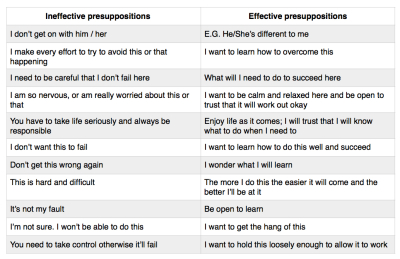Mirror Mirror on the Wall

Talking to yourself - healthy or bad? Here’s how to give yourself the medicine and use purposeful language to achieve personal success and lead others.
You? Yes, you! Do you talk to yourself too?
An article in The Daily Mail caught my eye recently. The article, headlined “Why talking to yourself is NOT a sign of a mental illness”, reflected on a psychologist Paloma Mari-Beffa’s view that both inner self-talk and talking out loud can have very positive effects.
The article highlights that inner self-talk (and yes we ALL talk to ourselves in our heads) is a key part of how our minds work to manage the way we function. Talking out loud can amplify the self-instruction element of our internal conversation to increase control over a task and improve performance.
I can vouch for the positive impact of self-talk based on my experience of coaching leaders and working with teams.
Interestingly the starting point is often not so much about improving performance as it is about taking control of the nature of inner self-talk and use of verbal language. This is important for all leaders.
In contrast, negative self-talk can be a significant factor in compounding feelings of low confidence, self-doubt, insecurity or poor motivation. I have worked with many, otherwise highly intelligent, competent and capable people who have quite literally talked themselves out of solving personal or business problems.
How about you? Yes, you! Do you find that you talk to yourself using negative and limiting language too?
Fortunately, if you do (and many people do), there are a variety of ways in which we can take control of what’s happening.
Oi! Mind your language
One very useful tool is to reframe your negative emotions by introducing language that promotes a positive or growth mindset instead. At the very least it is helpful to soften your emotive and negative language.
For example, instead of telling yourself, ‘the last project was a complete failure.’ Instead, how about saying ‘we learned a lot of valuable lessons from the last project.’
Here are some further examples from my upcoming book (details at end of article) about using purposeful language:

I’ll come back to some of these again shortly.
Becoming self-aware of your self-talk and verbal language is a major step towards gaining strong emotional intelligence skills. In this way, you quickly become aware of how easy it is to replace highly emotive words that have a negative impact on you and others, with softer and more positive words.
For example, ‘concerned’ to ‘aware’, ‘insecure’ to ‘unsure’ or ‘furious’ to ‘passionate.’
(For more details to practise this, head over to my website and download - use purposeful language worksheets. It’s a practical resource that helps you to master positive growth-based language for yourself. Better still try them with your team).
What if?
Another reframing tool is to pose ‘What if?’ questions to yourself. For instance:
‘What if the Board likes our marketing strategy’ or, ‘What if my experience is just right for the new job.’ These sorts of questions stimulate your brain into thinking and presupposing positively instead about your situations and activities that you are considering. It’s a nice way to conjure up some attractive scenarios that will naturally introduce you to more resourceful ways to talk to yourself and to others too.
That leads me to a third idea (and of course there are lots more), which is the use of affirmations.
This quite simply uses the language you have uncovered in your reframing to make positive statements to yourself. Back to the Daily Mail article, you can even follow Paloma Mari-Beffa’s advice and say them out loud for added performance:
Stand in front of the mirror and practise, tell yourself that ‘I am an effective leader’ or ‘the presentation will be a success’. Remember to match your language with open and empowered body postures too (see my mini blog - strike a pose for more information on this subject). Top tip - best to do this alone - otherwise you’ll look a right ‘turkey.’
You’ll be amazed how quickly your mind will work to make those statements come true.
Don’t hit the ball in the water
Every golf player quickly learns not to say or think: ‘Don’t hit the ball in the water.’ Or ‘Don’t muff this shot up.’ That’s because these phrases will predispose them to do exactly that – so the ball ends up in the water, and the shot gets muffed up.
We often hear ‘Don’t worry about…’ this or that, or ‘don’t get this wrong’. However, this type of language results in you focussing on this or that worry and getting things wrong.
The saying ‘Be careful what you wish for’ certainly holds true.
Thinking about what you don’t want sets up your attention to think about the very thing you don’t want. Ultimately this can lead to low performance. So instead, a more successful strategy is to think about what you do want, rather than what you don’t want.
I have seen some fast and fantastic results spring from leaders and teams learning how to use purposeful language in powerful ways in one-to-one coaching sessions as well as group workshops. It’s often one of the first steps towards unblocking the obstacles that are preventing peoples’ potential to be realised.
Over the years I have become skilled at helping people to use purposeful language to persuade, influence and engage others. I know it works. So, if this article has struck a chord with you, or the idea of creating success through language resonates with you and for your organisation, then why not get in touch today. Let’s discuss how we can make your language work for you and your team.
Read this and more from Andrew Jenkins.
Identify your path to CFO success by taking our CFO Readiness Assessmentᵀᴹ.
Become a Member today and get 30% off on-demand courses and tools!
For the most up to date and relevant accounting, finance, treasury and leadership headlines all in one place subscribe to The Balanced Digest.
Follow us on Linkedin!
